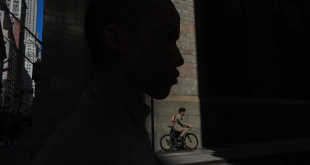Dave Schweidenback, director of Pedals For Progress, the US bicycles-to-the-Developing-World organisation, told BikeBiz.com: "We work with economic development projects, we are not suited to disaster relief."
His UK counterpart, Merlin Matthews of Re~Cycle, agrees:
"There are already a wad-load of bikes out in Asia. It’s bike-central. Bikes are more for long term projects, the tsunami affected countries need water, blankets and shelters, not more bikes."
Of course, that’s not to say bicycles won’t be needed. In fact, TV pictures have already shown ‘the people’s porter’ being used to ferry people and supplies in areas only helicoptors have so far been able to access.
With roads washed out, bicycles can still get through.
During the Vietnam war the Viet Cong were able to continue supplying their troops through the use of hundreds of thousands of bikes. Massive American air power could not stop the flow of supplies bicycled to the south on the Ho Chi Minh Trail.
And the type of bicycles used by the Viet Cong – heavy, utilitarian beasts, built to take punishment – are the type of bicycles still seen in Asia today.
Most of the countries impacted by Boxing Day’s tsunami have indigenous bicycle industries. Prior to the disaster, these countries have prevented the importation of ‘free’ bicycles, donated by bicycle refurb agencies in the US and Europe.
"Last year my first container to Sri Lanka was confiscated in Colombo," said Schweidenback of Pedals for Progress.
"The government refused to allow it in. The same thing happened a year earlier in Pakistan. The Indian government has long been uninterested in allowing us entry."
This is why the refurb orgs concentrate on shipping bikes to places without indigenous cycle industries, such as Africa and Latin America.
And shipping bicycles to Asia – akin to sending coals to Newcastle, albeit the wrong sort of coal – is not in the short-term or long-term interests of the countries affected by the tsunami.
"People fixate on the most current disaster and forget about the people still struggling to overcome previous disasters," said Schweidenback.
Pedals for Progress has partners in El Salvador and Nicaragua, countries which were on the front pages a few years ago because of Hurricane Mitch.
Any individuals wishing to help the victims of the tsunami should donate cash to the aid agencies working on the ground, and should not think their old bikes will be shipped out to Asia, said Re~Cycle’s Merlin Matthews.
And UK bicycle buyers will be helping the bicycle industries in Bangladesh, Thailand, Indonesia, India and Sri Lanka because those countries build Britain’s bikes: the UK no longer has any largescale bicycle manufacturing capability, importing 3.2 million bikes from outside the European Union…
Donate by credit card:
 BikeBiz Bicycle and cycling retail news
BikeBiz Bicycle and cycling retail news



